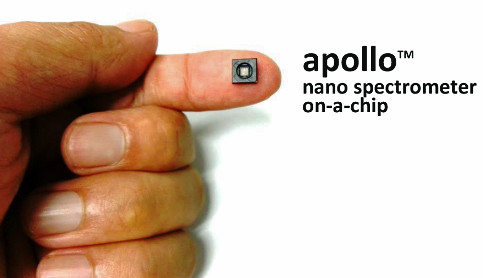Spectrometer-on-a-Chip
on

A California-based start-up called NanoLambda have developed a low-cost ($10) spectrometer sensor chip called Apollo which makes possible a wide range of new sensing applications. The sensor is capable of measuring individual wavelengths of light and is accurate to 1 nm with 10 nm resolution.
Optical spectroscopy is a very powerful non-invasive diagnostic technique and has been used for decades in many fields including health care. However the equipment cost using traditional methods of spectrum analysis has limited its area of application to professional use only. Using the company’s nano fusion technology NanoLambda have fabricated a sensor from thin nanofilter arrays which reduces the size and cost to about 1 % compared with traditional sensing equipment. The sensor’s sensitivity bandwidth can be defined in the manufacturing process and even allows detection in the infra-red region. The small physical size of the sensor makes it ideal for use for unobtrusive, wearable health monitoring applications.
To support development of new applications for the sensor the company plans to release a software developer kit (which runs on both Linux and Windows systems) in the first few months of 2015.


Discussion (0 comments)